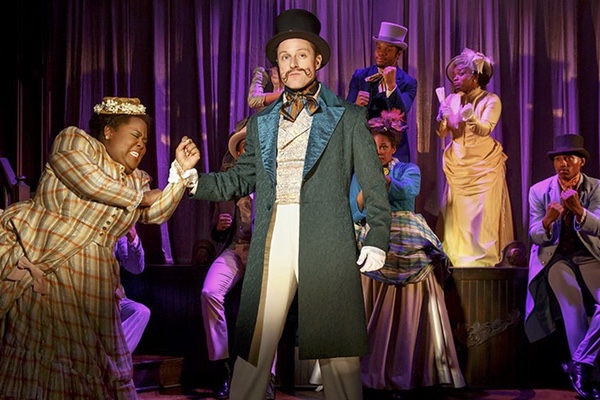A Playwright Set Out to Draw Attention to the Overlooked Larger-than-Life Black Characters in the Old West

In a note that she wrote for the program of her play, Bella: An American Tall Tale, playwright Kirsten Childs said that the Old West was full of fascinating stories about people of color that were overlooked by the historians. To correct that, she sat down and wrote a musical about a black woman, Bella, who traveled from Missouri to New Mexico and encountered many interesting African American characters along the way, all of whom were overlooked by history.
In her journey, undertaken in 1877, Bella wound up meeting black ranch baron Tommy Haw, a regiment of black troops, the fabled “Buffalo Soldiers,” black and white circus performers, scary train robbers and even Carnegie Hall impressarios. It was an eventful trip that made her famous, and in the end, she had to weigh fame against true love.
On paper, it is a crisp idea for a story and a nice look at history. There are several problems with the play, that opened last night at Playwright Horizon, on W. 42d Street, in New York, though. First, playwright Childs claims that the real stories of minorities in the West were never told, but she tells them in a disorganized way and underplays all of the strong points of black life herself. Second, the story is about Bella Patterson, a woman whose sole claim to fame is her huge butt. That is a stereotype and no one should make fun of women like Bella, as Childs does, and for a very long two hours and forty minutes. There are millions of Americans, men and women, black and white, who are overweight in this country and this is a problem. They do not need sassy playwrights poking fun at them. Third, the play is 45 minutes to an hour too long, drags in many places, is often tedious and lacks a comprehensive story. It is a travelogue, not a play, and is all over the place. Bella went here and here, there and there. End.
The musical, with songs by Ms. Childs, too, set in numerous places, even Africa, has no solid song and most of the tunes sound the same. It gets monotonous and fast.
In the lobby, the theater has posted an intriguing bulletin board full of photos of noted blacks in the West, such as Nat Love, the famous Deadwood Dick, Bass Reeves, the first black U.S. Marshall west of the Mississippi (he made 3,000 arrests) Mary Springfield, Stage Coach Mary, who was the West’s first post woman, and Bill Pickett, the celebrated rodeo star about whom a movie was made. Their stories do not appear in the play though, and they should.
Ms. Kirsten also plays with racial fire in a sad scene in which Bella, a bone in her hair and dressed in a leopard skin dress, leads a song about cannibalism (a white victim here) that is disturbing.
Ms. Childs has a song right at the start of the play in which the cast sings that history is all tall tales, and not the truth, but she just does not give the audience a better and more honest story.
The performers in the show do a fine job with the shaky script that they have. Ashley D. Kelly is a sturdy Bella and she is on stage just about through the entire play. Other fine performances are by Marinda Anderson as Aunt Dinah, Paolo Montalban as Tommy Haw, Britton Smith as soldier Aloysius T. Honeycutt and Brandon Gill as Nathaniel Beckworth. The members of the ensemble cast are good.
Director Robert O’Hara does fine work with the story, particularly in the circus section of the narrative.
The concept of the play is good, but the execution of it by Ms. Childs, and her decision to make Bella’s big butt the focus of the play, is unfortunate.
PRODUCTION: The play is produced by Playwrights Horizon. Scenic Design: Clint Ramos, Costumes: Dede M. Ayite, Lighting: Japhy Weideman, Sound: Lindsay Jones, Projection Design: Jeff Sugg. Choreography is by Camille A. Brown. The play is directed by Robert O’Hara. The play runs through July 2.